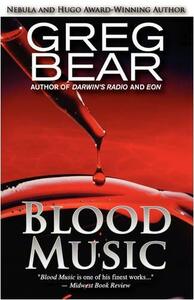Take a photo of a barcode or cover
This week I started and finished reading a trilogy by this author. My first encounter with Greg Bear (see what I did there? *lol*). I wasn't overly impressed although I liked the writing style. According to my buddy-reader and constant volunteller, Brad, the trilogy was NOT the author's best work, not by far, and I should read this short story.
So I did.
The story is about a scientist experimenting with biochips (computer chips that can be put in a human body). In the tradition of scientific horror stories, he takes it too far, even by the standards of the biotech company he's working for, and therefore gets fired. Panicking, he injects himself with his invention (of course) and that is where the fun begins.
As William Blake said: To see a World in a Grain of Sand...
I really liked the story and the creepy crawly feeling it invoked. Imagine knowing that intelligent biochips are inside you but you have no control over them and no knowledge of what they are going to do. Will they be trying to conquer, take over? Will they worship the body they live in as a deity? Just how intelligent can they become? Was that just a normal itch or some change the things have initiated?
I was wondering but it doesn't really matter for the overall atmosphere and message or the progression of the story.
The characters were relatively flat (much like in the trilogy) so I'm left also wondering if characterisations are a weak point of this author or if it was deliberate here because it was supposed to be all about the science and the individuals didn't matter.
Anyway, nice and creepy story that marks the perfect transition from September to Spooktober. ;)
So I did.
The story is about a scientist experimenting with biochips (computer chips that can be put in a human body). In the tradition of scientific horror stories, he takes it too far, even by the standards of the biotech company he's working for, and therefore gets fired. Panicking, he injects himself with his invention (of course) and that is where the fun begins.
As William Blake said: To see a World in a Grain of Sand...
I really liked the story and the creepy crawly feeling it invoked. Imagine knowing that intelligent biochips are inside you but you have no control over them and no knowledge of what they are going to do. Will they be trying to conquer, take over? Will they worship the body they live in as a deity? Just how intelligent can they become? Was that just a normal itch or some change the things have initiated?
I was wondering
Spoiler
why it took them so long before the doctor realized he had been infected and if the sweaty palm trick hadn't also worked on the Bernard guySpoiler
Though I was almost a bit disappointed that it turned squishy instead of techy - maybe I was hoping for a more metal-ish evolution (think Robocop or the nanites from Stargate) but if you only have a squishy body to work with ...The characters were relatively flat (much like in the trilogy) so I'm left also wondering if characterisations are a weak point of this author or if it was deliberate here because it was supposed to be all about the science and the
Spoiler
oldAnyway, nice and creepy story that marks the perfect transition from September to Spooktober. ;)
I'm not sure why I hadn't read this before, Greg Bear is an excellent writer. A somewhat cautionary tale of biotechnology run rampant. It may lead to disaster or a new tomorrow. Stay tuned.
challenging
dark
tense
medium-paced
Plot or Character Driven:
Character
Strong character development:
Complicated
Loveable characters:
No
Diverse cast of characters:
No
Flaws of characters a main focus:
No
Moderate: Body horror, Medical content, Medical trauma
Minor: Rape
Just re-read this again; I return to this more than any of Bear's work.
This is a wonderfully science-fictional novel; I actually use Blood Music as a sort of loose rubric for "how SF" something is.
Things change, and keep on changing; they don't go back the way they were. As a reader, one is forced to form an opinion on radical ideas--in this case, the revision of the entire human race, possibly the entire universe.
Characterization is spotty and jumpy at best. But that's not what this about; it's about ideas.
What starts out feeling like a medical/plague thriller winds up quite rightly compared to [b:Childhood's End|414999|Childhood's End|Arthur C. Clarke|https://d.gr-assets.com/books/1320552628s/414999.jpg|209414], although instead of aliens and psi, Bear mashes up nanotech, bioengineering, and some fun physics/information theories to create one of the earliest clear-cut fictional explorations of the Singularity.
Highly recommended.
This is a wonderfully science-fictional novel; I actually use Blood Music as a sort of loose rubric for "how SF" something is.
Things change, and keep on changing; they don't go back the way they were. As a reader, one is forced to form an opinion on radical ideas--in this case, the revision of the entire human race, possibly the entire universe.
Characterization is spotty and jumpy at best. But that's not what this about; it's about ideas.
What starts out feeling like a medical/plague thriller winds up quite rightly compared to [b:Childhood's End|414999|Childhood's End|Arthur C. Clarke|https://d.gr-assets.com/books/1320552628s/414999.jpg|209414], although instead of aliens and psi, Bear mashes up nanotech, bioengineering, and some fun physics/information theories to create one of the earliest clear-cut fictional explorations of the Singularity.
Highly recommended.
Choppy and uneven. The idea central to the story - essentially a version of the "nanotechnology takes over the world" trope - is very well done, and stays interesting as it evolves to the end. There is a great story in here if the ideas were properly woven with well-constructed characters and dialogue.
The book comes up well short on those accounts. The characters, with a possible exception of Virgil, are cardboard. The dialogue, with no exception, is pretty amateurish. The reader is repeatedly beat over the head with lines that real people would never say, and it prevents full engagement with the story.
The ideas are great food for thought, and it's an easy read. I can see myself recommending the book to someone with the right set of interests.
The book comes up well short on those accounts. The characters, with a possible exception of Virgil, are cardboard. The dialogue, with no exception, is pretty amateurish. The reader is repeatedly beat over the head with lines that real people would never say, and it prevents full engagement with the story.
The ideas are great food for thought, and it's an easy read. I can see myself recommending the book to someone with the right set of interests.
I was fascinated by the concept -- which has been replicated many times over since Bear wrote this -- but less interested in the characters.
adventurous
dark
hopeful
reflective
tense
fast-paced
Plot or Character Driven:
Plot
Strong character development:
Complicated
Loveable characters:
No
Diverse cast of characters:
No
Flaws of characters a main focus:
Yes
This book was terrifyingly amazing. It was such an incredible story of apocalypse. I just wish that the ending wasn’t so flat. If it was only at the same level as the rest of the story it would have been 5 stars
Después de muchos años buscando en librería de viejo, al fin pude leer esta novela. Supongo que la expectación creada me lleva a no puntuarla muy alto. Le doy 3 estrellas *** que se pueden repartir entre las tres partes de la novela en algo así como 4 **** para la primera parte, 3 *** para la central y 2 ** o menos para el final.
La novela viene de alargar un relato ganador de un premio por lo que cuenta con 3 partes diferentes. La primera que es la que más me gustó para mí tenía un fondo científico interesante, aunque me entero por el blog de Rescepto que no está bien fundada: Música en la sangre por Rescepto indablog.
En cualquier caso entretenida a ratos y lo mismo alguien repite argumento, que en esencia me sigue gustando, sin estropearlo tanto.
La novela viene de alargar un relato ganador de un premio por lo que cuenta con 3 partes diferentes. La primera que es la que más me gustó para mí tenía un fondo científico interesante, aunque me entero por el blog de Rescepto que no está bien fundada: Música en la sangre por Rescepto indablog.
En cualquier caso entretenida a ratos y lo mismo alguien repite argumento, que en esencia me sigue gustando, sin estropearlo tanto.
The original gray goo apocalypse. These days we're afraid of nanotechnology and cyber-singularities, but apart from a couple is quaint leftovers from the eighties (disk drives, what no Internet?) it's still a fresh as when I first read it.





